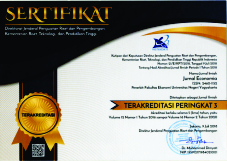Analysis of Implementation Indonesia-Japan Economic Partnership Agreement (IJEPA) Toward Export Value Growth in Indonesia
Downloads
This study aims to analyze the impact of the Indonesia-Japan Economic Partnership Agreement (IJEPA) bilateral trade agreement on Indonesia's export value in the long term. The secondary data time series used for the research is from 2005Q1 to 2019Q4, and the research method employed is the VECM (Vector Error Correction Model). The results of the VECM analysis show that the IJEP bilateral agreement has a significant negative effect, the inflation variable has a significant positive effect, and the FDI and exchange rate variables have a negative but not significant effect on the value of Indonesia's exports to Japan. Implementation of the recommended policies to increase export value and economic growth, namely compliance with product standardization, especially for destination countries, actively and openly providing information related to the IJEPA tariff scheme and utilizing capacity building.
Downloads
Alhayat, Aditya Paramita, and Azis Muslim. 2016. "Proyeksi Ekspor Dan Impor Indonesia: Suatu Pendekatan Vector Autoregressive." Buletin Ilmiah Litbang Perdagangan 10(1):87–102. doi: 10.30908/bilp.v10i1.32.
Ardiyanti, Septika Tri. 2015. "Dampak Perjanjian Perdagangan Indonesia - Jepang (Ijepa) Terhadap Kinerja Perdagangan Bilateral." Buletin Ilmiah Litbang Perdagangan 9(2):129–51. doi: 10.30908/bilp.v9i2.5.
Arifin, SJamsul, Dian Ediana Rae, and Charles P. .. Joseph. 2004. Kerja Sama Perdagangan Internasional: Peluang Dan Tantangan Bagi Indonesia - Google Buku. Jakarta: PT Elex Media Kompuntindo.
Bhadu, Sushil, and Garima Pant. 2011. "Impact of WTO on Bilateral Trade Between India and China." 8(2):183–96.
Engle, Robert F., and C. W. J. Granger. 1987. "Co-Integration and Error Correction : Representation , Estimation ,." Econometrica 55(2):251–76.
Firdaus, Rizky Wendi. 2014. "Implementasi Indonesia-Japan Economic Partnership Agreement Terhadap Defisitnya Neraca Perdagangan Sektor Non Migas Indonesia-Jepang 2008-2012." Jurnal Analisis Hubungan Internasional 3(2):597–20613.
Gocklas C.S, Levi, and Sri Sulasmiyati. 2017. "Analisis Pengaruh Indonesia-Japan Economic Partnership Agreement (IJEPA) Terhadap Nilai Perdagangan Indonesia-Jepang (Studi Pada Badan Pusat Statistik 2000-2016)." Jurnal Administrasi Bisnis (JAB)|Vol 50(5):191–200.
Ha, Yeong Seok, Keun Jon Chung, and Jung Soo Seo. 2016. "An Analysis of Korea-ASEAN Trade and Its Implications for the Shipping Industry in Korea." Asian Journal of Shipping and Logistics 32(2):63–71. doi: 10.1016/j.ajsl.2016.06.002.
Hasoloan, Jimmy. 2013. "Peranan Perdagangan Internasional Dalam Produktifitas Dan Perekonomian." Jurnal Ilmiah Pend. Ekonomi 1(2):102–12.
Kementerian Keuangan RI. 2019. Menjaga Laju Perekonomian Di Tengah Gejolak Global. Jakarta.
Kementerian Perdagangan. 2018. "Fact Sheet Indonesia-Japan Economic Partnership Agreement (IJEPA)." Kementerian Perdagangan Republik Indonesia.
Kementerian Perdagangan Republik Indonesia. 2015. "Laporan Akhir Analisis Review Indonesia Japan Economic Partnership Agreement (IJEPA) Dalam Perdagangan Barang."
Kipkorir, Chris Simon Sitenei, and Marites Khanser. 2015. "Trade Policy Implications on Food Security in Rice and Maize in Kenya and the Philippines." DLSU Business and Economics Review 24(2):45–64.
Maswana, Jean-Claude. 2020. "African Economies in the Shadow of China: Effects of Bilateral Trade Structure on Economic Growth in Africa." Foreign Trade Review 55(1):80–92. doi: 10.1177/0015732519886791.
Piros, Christopher D., and Jerald E. Pinto. 2013. Economics For Investment Decision Maker: Micro, Macro, and International Economics. New Jers: j.
Salam, Aziza R., Sefiani Rayadiani, and Immanuel Lingga. 2012. "IJ_EPA and Its Implication to Trade Performance of Indonesia-Japan." Buletin Ilmiah Litbang Perdagangan 6(1):19.
Salvatore, Dominick. 2013. Internasional Economic. 11th ed. John Wiley & Sons Inc.
Setiawan, Sigit. 2012. "Analisis Dampak IJEPA Terhadap Indonesia Dan Jepang." Jurnal Ilmiah Ekonomi Bisnis 17(2):201–10.
Shelaby, Ayman, Mohamed Mohamed, and Sayed Salah. 2018. "The Potential of Bilateral Trade Between Egypt and Nile Basin Countries: A Gravity Model Approach." Alanya Akademik Bakış (August). doi: 10.29023/alanyaakademik.338645.
Sinay, Lexy J. 2014. "Pendekatan Vector Error Correction Model Untuk Analisis Hubungan Inflasi, Bi Rate Dan Kurs Dolar Amerika Serikat." BAREKENG: Jurnal Ilmu Matematika Dan Terapan 8(2):9–18. doi: 10.30598/barekengvol8iss2pp9-18.
Tampubolon, Jongkers. 2020. Perdagangan Dan Bisnis Internasional, Teori Dan Analisis Empiris - Google Play. Sleman: Deepublish.
Yuliati, Lilis, Purna Pria Atmaja, and Endah Kurnia Lestari. 2020. "Analysis Trade Integration of Indonesia and Turkey Non-Oil Sector." Jejak 13(1):149–69. doi: 10.15294/jejak.v13i1.21188.















